 |
GCGlib
0.04.228
GCG Graphics Engine
|
 |
GCGlib
0.04.228
GCG Graphics Engine
|
#include <gcg.h>

Additional Inherited Members | |
 Public Member Functions inherited from gcgDISCRETE1D< NUMTYPE > Public Member Functions inherited from gcgDISCRETE1D< NUMTYPE > | |
| gcgDISCRETE1D () | |
| Constructs a valid but empty unidimensional signal. The signal can be used as destiny in any gcgDISCRETE1D<NUMTYPE> method. More... | |
| gcgDISCRETE1D (unsigned int length, int origin, NUMTYPE *sampledata=NULL, bool isstaticdata=false, int borderextension=GCG_BORDER_EXTENSION_CLAMP) | |
| Constructs a valid unidimensional signal and allocates its resources by calling createSignal(). More... | |
| virtual | ~gcgDISCRETE1D () |
| Frees all signal resources by calling destroySignal(). More... | |
| bool | createSignal (unsigned int length, int origin, NUMTYPE *sampledata=NULL, bool isstaticdata=false, int borderextension=GCG_BORDER_EXTENSION_CLAMP) |
| Unidimensional creation. Allocates all necessary space for the signal indicated by the parameters. More... | |
| bool | destroySignal () |
| Releases all resources used by the signal. After destroyed, the signal becomes invalid and must be recreated. More... | |
| bool | createSimilar (gcgDISCRETE1D< float > *source) |
| Creates a signal with the same length, origin and border extension of another source signal. This is useful for creating temporary signals compatible with the source. More... | |
| bool | createSimilar (gcgDISCRETE1D< double > *source) |
| Creates a signal with the same length, origin and border extension of another source signal. This is useful for creating temporary signals compatible with the source. More... | |
| bool | createSimilar (gcgDISCRETE1D< short > *source) |
| Creates a signal with the same length, origin and border extension of another source signal. This is useful for creating temporary signals compatible with the source. More... | |
| bool | createSimilar (gcgDISCRETE1D< int > *source) |
| Creates a signal with the same length, origin and border extension of another source signal. This is useful for creating temporary signals compatible with the source. More... | |
| bool | createSimilar (gcgDISCRETE1D< long > *source) |
| Creates a signal with the same length, origin and border extension of another source signal. This is useful for creating temporary signals compatible with the source. More... | |
 Public Member Functions inherited from gcgCLASS Public Member Functions inherited from gcgCLASS | |
| void * | operator new (size_t size) |
| Defines a new operator to be used by instatiations of GCGlib classes instead the global one. More... | |
| void * | operator new (size_t size, const std::nothrow_t &) throw () |
| Defines a new operator to be used by instantiations of GCGlib classes instead the global one. Returns a NULL pointer instead of throwing an exception if an error occurs. More... | |
| void * | operator new[] (size_t size) |
| Defines a new operator to be used by GCGlib array allocations instead the global one. More... | |
| void * | operator new[] (size_t size, const std::nothrow_t &) throw () |
| Defines a new operator to be used by vector allocations instead the global one. More... | |
| void | operator delete (void *p) |
| Defines a delete operator to free instances of GCGlib classes instead the global one. It is designed to match the new operator. More... | |
| void | operator delete (void *p, const std::nothrow_t &) throw () |
| Defines a delete operator to free instances of GCGlib classes instead the global one. It is designed to match the new operator. More... | |
| void | operator delete[] (void *p) |
| Defines a delete operator to free instances of arrays for GCGlib classes instead the global one. It is designed to match the new[] operator. More... | |
| void | operator delete[] (void *p, const std::nothrow_t &) throw () |
| Defines a delete operator to free instances of arrays for GCGlib classes instead the global one. It is designed to match the new[] operator. More... | |
 Public Attributes inherited from gcgDISCRETE1D< NUMTYPE > Public Attributes inherited from gcgDISCRETE1D< NUMTYPE > | |
| NUMTYPE * | data |
| Pointer to the signal samples. | |
| unsigned int | length |
| Signal length = number of samples. | |
| bool | isstaticdata |
| True if the data pointer data must not be deleted by this object. | |
| int | origin |
| Origin coordinate: indicates the sample position of the origin (x = 0) of the signal. | |
| int | extension |
| Defines the way the borders have to be extended. | |
| NUMTYPE | Type of the samples representing the signal. Supported types: float, double, long, int and short. |